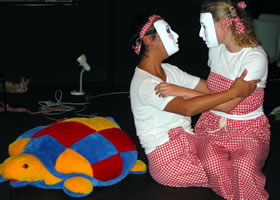What Is Drama?

The Classical Definition of Drama
‘Drama’ is an Ancient Greek word meaning ‘act’ or ‘deed’. The Ancient Greek philosopher Aristotle used this term in a very influential treatise called the Poetics. In this text, Aristotle classified different forms of poetry according to basic features he thought could be commonly recognised in their composition. He used the term ‘drama’ to describe poetic compositions that were ‘acted’ in front of audiences in a theatron.
While Aristotle offered drama as a general term to describe forms of poetry that were ‘acted’, he identified different types of composition within this category, including comedy and tragedy. He regarded comedy as a form of drama because it represented acts that made audiences laugh and he considered tragedy a form of drama because it represented acts that made audiences feel pity or fear. The Roman theorist Horace introduced another view of these poetic forms when he suggested that their purpose was to either delight or instruct. Although various definitions and developments in drama must be considered in addition to Aristotle’s original assessment of dramas, many of the terms of classification he introduced are still used or debated today.
Examples: Greek Comedy, Greek Tragedy
References:
Aristotle. The Poetics of Aristotle. Trans. Stephen Halliwell. London: Duckworth, 1987.
Green, J.R. Theatre in Ancient Greek Society. New York; London: Routledge, 1994.
Drama as Imitation
Aristotle suggested that some forms of poetry could be identified as ‘dramas’ because they had written compositions that represented ‘men acting’ and the presentation of the compositions required men to act as the men represented in the texts. This system of classification therefore contains a distinction between dramatic texts and performances that often requires further clarification. Aristotle argued that dramatic texts and performances imitated actions or deeds performed by people in real life. He called the process of imitation he identified in the dramas he analysed mimesis.This concept has sometimes been used to suggest that written compositions that are ‘acted’ offer representations of activities that copy reality in some way. However, Aristotle’s arguments can also suggest that dramas offer quite unique kinds of poetry because they use real actions, ideas and texts to construct possible views of reality. Those studying dramas today therefore need to consider what views of reality may be represented in texts and what views of reality may be presented in performance.
Examples: Naturalism, Realism, Brechtian Theatre, Theatre of the Absurd
References:
Aristotle. The Poetics of Aristotle. Trans. Stephen Halliwell. London: Duckworth, 1987.
Diamond, E. Unmaking Mimesis: Essays on Feminism and Theater. London, Routledge, 1997.
Ley, Graham. From Mimesis to Interculturalism: Readings of Theatrical Theory Before and After ‘Modernism’. Exeter: U of Exeter P, 1997.
Taussig, Michael. Mimesis and Alterity: A Particular History of the Senses. New York; London: Routledge, 1993.
Drama as Action
Aristotle argued that actors in a drama aim to mimic actions rather than perform real actions. While his view has been influential, exploring how the concept of imitation relates to drama is crucial to an understanding of dramatic activity. Dramatic ‘acting’ involves more than simply copying actions that are described by playwrights or performed by people in everyday life. For example, someone who performs a murder in a drama is unlikely to produce an exact replica of a murder that has really occurred. Since those acting dramas probably wish to avoid causing trauma to others or being dragged off to prison, it is likely that an actor would try to find an action that can suggest the action of murder. Actors may still choose to perform actions that are copies of ‘real’ or ‘imagined’ actions but they always need to be mindful of the consequences and impact of their actions on themselves and on their audiences. Since those ‘acting’ dramas are also really performing actions, those who are performing actions need to consider how their actions will impact upon the different views and values in different audiences.
Examples: Boal’s ‘Invisible Theatre’ and Artaud’s ‘Theatre of Cruelty’
References:
Aristotle. The Poetics of Aristotle. Trans. Stephen Halliwell. London: Duckworth, 1987.
Boal, Augusto.
Theater of the Oppressed. Trans. Charles A. McBride and Maria-Odilia Leal McBride. London: Pluto, 1979.
Brecht, Bertolt. Brecht on Theatre: The Development of an Aesthetic. Ed. and trans., John Willett. London: Eyre Methuen, 1974.
Diderot, Denis. The Paradox of Acting. New York: Hill and Wang, 1957.
Rayner, Alice. To Act, To Do, To Perform: Drama and the Phenomenology of Action. Ann Arbor: U of Michigan P, 1994.
Roach, Joseph. The Player’s Passion: Studies in the Science of Acting. Ann Arbor: U of Michigan P, 2002.
Schumacher, Claude, ed. Artaud on Theatre. London: Methuen Drama, 1989.
Stanislavskii, Konstantin. Building a Character. Trans. Elizabeth Reynolds Hapgood. London: Methuen, 1968.
Zeami. On the Art of the No Drama: The Major Treatises of Zeami. Princeton, Princeton UP, 1984.


